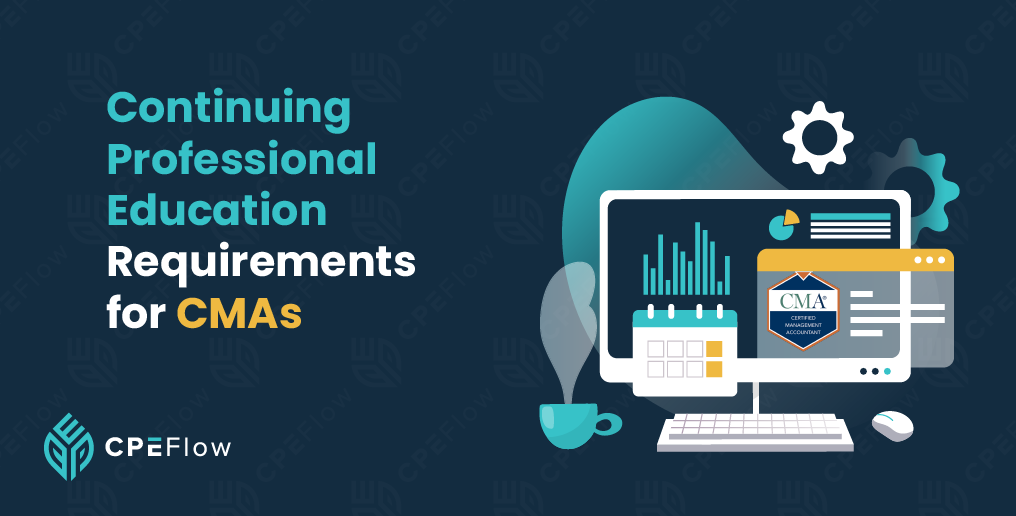After completing the years of studying and dedication required to obtain your CMA, it can be tempting to think that passing the exam means the hard work is over.
But the truth is that holding a CMA is a big responsibility that necessitates a continued commitment to professional development. That’s why the IMA requires all CMAs complete annual Continuing Professional Education (CPE) hours in order to maintain their certification status.
Before you roll your eyes at the thought of more studying, hear me out. On paper, CPE might seem like a chore, but it’s actually a fantastic way to adapt to changes in the industry landscape, offer better services to your employer, and remain competitive with other professionals.
In this article, I’ll break down everything you need to know about CPE hours for CMAs and the different options you have for staying compliant with the IMA’s requirements.
All CMAs must complete at least 30 CPE hours each year. Depending on the type of CPE you complete, the way to measure hours varies—but more on that later.
For now, here are the basics:
- CMA requirements begin one calendar year after the professional earns their certification.
- A calendar year for CPE hours is between January 1 and December 31.
- CPE hours must be in approved subjects.A minimum of two hours in ethics courses is required annually.
- CMAs who earn more than 30 hours can carry over up to 10 hours to the following year.
It’s absolutely necessary to be in good standing with the IMA if you want to have a good career as a CMA. This means you have to play by their rules. If you neglect to meet the CPE requirements, your IMA account will be deactivated and your CMA status will be revoked.
Until you resolve the issue, your account will be considered delinquent. This could have a seriously negative effect on your career opportunities and could even place your current position in jeopardy. So if this happens, be sure to resolve the issue as quickly as possible.
After you’ve been flagged for noncompliance with CPE requirements, you’ll have the following calendar year to earn a total of 60 hours. Failing to do so will result in the permanent deactivation of your account.
CMAs are required to log and report their own CPE hours, so I recommend you keep a well-organized file of transcripts, receipts, and any other documentation. Throughout the year, you should upload the relevant information to the transcripts section of your IMA profile.
Each year, the IMA will conduct randomized audits. If you are chosen for an audit, a member of the IMA will examine your documents to ensure you are compliant. This is why it’s absolutely necessary to keep records of every CPE hour you complete.
Here’s a list of some documents you should keep:
- Proof of registration or enrollment
- Attendance records
- Progress reports
- Certificates of completion
- Performance records
Keep these records neatly organized by calendar year and store them for a minimum of three to five years after the end of each reporting cycle.
You worked hard to earn a CMA because of the value it can add to your professional life. Have you ever heard the saying: “nothing good comes easy”? It applies here.
The reason the CMA is so valuable to employers is that it demonstrates your commitment to professional development. Companies that hire CMAs feel confident that they will be working with a dedicated professional who takes their position seriously.
Yes, there is work involved in upholding that standard of distinction. But if it was easy, everyone would do it.
Not all subjects are acceptable for CPE hours. They must be relevant to your position and industry.
The IMA has outlined a list of approved subjects. Here they are:
- Accounting
- Business applications of mathematics and statistics
- Business law
- Computer science
- Economics
- Ethics
- Financial management
- Management
- Marketing
- Production
- Organizational behavior
The IMA website will provide more detailed information about specific courses and whether or not they meet the requirements.It’s also important to note that a minimum of two hours in ethics courses is required annually. If you complete four hours in a calendar year, you are allowed to transfer two hours to the following year.
To give yourself your best shot at managing your CPE courseload, you should create a study plan. Don’t try to squeeze all 30 hours into the final few weeks of the year. That will only result in unnecessary stress.
Plus, these days, there are a ton of ways for CMAs to get CPE hours. The hours must be earned in a formal environment (no, standard job training does not qualify) and it must involve NASBA-approved training material.
Not all of the options available to you are equally engaging, beneficial, and accessible, though. So let’s explore to see which ones might work best.
If an online or in-person college or university program is at least 10 weeks long, it could count towards your CPE hours.
Here’s how college credits work:
- One semester equals 15 credits
- One-quarter semester equals 10 credits
- One 50-minute class equals one credit
Courses that are less than 10 weeks long may also qualify, so long as they are formally taught by an expert. This option also provides the added benefit of being a networking opportunity.
Here’s how short course credits work:
- One 50-minute seminar equals one credit
- A course lasting 6.5 hours or more equals eight credits
If you don’t claim your exam prep hours or self-study program hours, you can claim up to 10 credits for professional designation exams, with each hour counting as one credit.
Accessible, entertaining, and relevant, study courses are by far the most popular choice for CPE credits. Not only can you earn your credits from the comfort of your own home or office, but you also have access to a wider range of subject matter.
In our CPE Flow programs, for example, you learn from leading CMA experts through unique and engaging video masterclasses, all from your couch.
If you teach at a college or university, you can claim lecturer hours as CPE credits under the following conditions:
- Credits are calculated by multiplying the course hours by the number of weeks for which the course runs.
- You can only claim credits for the same course once every three years or if the course material changes.
If you lead a professional, business-oriented seminar or discussion, you can claim CPE credits for one iteration of each different seminar.
Here are the details:
- The discussion must be affiliated with a professional development center, or associated with a college or university.
- Calculate your credits by doubling the number of hours of your presentation.
- If your presentation changes, you may claim additional credits.
If you create, submit, and publish relevant materials, you can claim CPE credits. Works that fall under the umbrella of technical articles, monographs, and books all qualify.
If you submit a work for publication but it is not accepted, you can claim half the credits it would have earned upon publication.
Here’s how published materials are calculated:
- Accounting and financial management articles can qualify for up to six credits.
- Books or monographs can qualify for up to 20 credits.
Unfortunately, there is no way to predetermine the number of credits that can be claimed from a published work because the IMA addresses each claim on a case-by-case basis.
Luckily, the majority of approved CPE courses for CMAs will state how many credits each class is worth, which makes it easy for you to keep track and earn the credits you need.
Before you create a plan for this year’s credits, calculate how many credits you can carry forward from last year. If you have 10 unused hours from last year, that means you only need to earn 20 this year.
Take the number of credits you need this year and divide it by 12. This will tell you how many hours you need to devote to CPE each month, which will be the basis for your plan.
My favorite way to earn CPE credits is through self-directed online courses. I love being able to study wherever and whenever is convenient for me. And being able to study classes that have a direct impact on my work helps me feel motivated and engaged.
That being said, there are some downsides to traditional self-study methods. It can be difficult to organize your own study plan. And not all self-study courses are relevant. In fact, some of them can be really boring.
It was this dilemma that inspired me to create CPE Flow, an ongoing series of exclusive CPE masterclasses taught by industry-leading Certified Management Accountants.
I wanted to make a CPE program that was fun, useful, and convenient. Imagine Netflix meets university; that’s CPE Flow. If you subscribe, you’ll get access to entertaining, culturally-relevant, and engaging masterclasses that will make earning CPE hours fun.
If that sounds interesting to you, join the other CMA professionals getting on board and check it out.
Thank you for reading,



